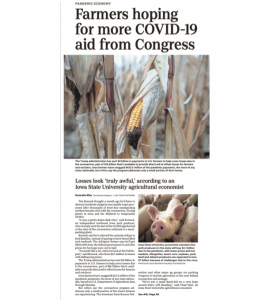COVID-19 Ag Related Losses Mount as China Seeks Virus Documentation on Soybeans
Donnelle Eller reported on the front page of Tuesday’s Des Moines Register that, “The Trump administration has sent $4 billion in payments to U.S. farmers to help cover losses due to the coronavirus, part of $16 billion that’s available to provide direct aid to offset losses for farmers and ranchers.

“Iowa farmers have snagged $423.5 million of the pandemic payments, the most of any state nationally, based on U.S. Department of Agriculture data through Monday.
“But critics say the coronavirus program addresses only a small portion of the losses farmers are experiencing. The American Farm Bureau Federation and other major ag groups are pushing Congress to include agriculture in the next federal coronavirus aid package.”
‘We’ve put a small Band-Aid on a very large wound that’s still bleeding,’ said Chad Hart, an Iowa State University agricultural economist.
Ms. Eller noted that, “Farm Bureau, which estimates the value of corn, soybeans, beef, pork and other commodities will fall by $50 billion through 2021 nationwide, is pushing congressional leaders to give the USDA access to $68 billion to address farm losses from the pandemic.
“ISU economists estimate that Iowa farmers — corn, soybean, pork, beef and ethanol producers — will lose nearly $7 billion due to the coronavirus outbreak. The largest hits are to ethanol producers, estimated to lose $2.5 billion, and hog producers, shorted an estimated $2.1 billion.”
USDA Daily #Ethanol Report, Jun 18, https://t.co/vCMyEktFEc @USDA_AMS
* #Iowa #corn and ethanol average prices.
* 2020, 2019, and five-year average. pic.twitter.com/0YsAznpxdq
— Farm Policy (@FarmPolicy) June 18, 2020
“The biggest coronavirus impact will come this fall, when farmers harvest their crops, experts say. Prices for corn, soybeans, pigs and cattle are below the cost to produce them,” the Register article said.
Tuesday’s article also pointed out that, “Growers had hoped for increased exports with China’s pledge to buy $36.6 billion worth of American farm goods this year under the first phase of its trade agreement with the U.S. But so far, China has purchased only $6.3 billion, about half of the country’s $12.2 billion year-to-date target, according to a Peterson Institute for International Economics tracker.
Is China planning on stepping up its purchases of U.S. ag products? Insights via @CMEGroup pic.twitter.com/t9k2tdGf7V
— Bloomberg QuickTake (@QuickTake) June 22, 2020
“While China is signaling it will increase purchases, it could take awhile. And short of adverse weather, U.S. farmers are expected to harvest a record 16 billion bushel corn crop this fall.
“‘Right now, it’s hard to find a pathway where we could find significant improvement in prices,’ Hart said. ‘We’re seeing some recovery, but it’s not rapid enough to match our ability to produce.’”
Apple prices have dropped during this pandemic. Apple farms are one of #NY22‘s most important industries & contribute millions to our local economy.
We’re leading 20+ members of Congress to urge USDA Sec. Perdue to use CARES Act funds to help apple growers get through #COVID19. pic.twitter.com/tR5xsWhw4W
— Rep. Anthony Brindisi (@RepBrindisi) June 23, 2020
Meanwhile, Bloomberg News writers Chelsea Mes and Jeff Black reported on Monday that, “U.S. President Donald Trump said the phase one trade deal with China was ‘fully intact,’ after his adviser Peter Navarro sowed confusion and spurred a temporary stock slump with comments interpreted as a decision to end the agreement.”
The China Trade Deal is fully intact. Hopefully they will continue to live up to the terms of the Agreement!
— Donald J. Trump (@realDonaldTrump) June 23, 2020
And Megan Henney reported on Tuesday at FoxBusiness Online that, “Senior White House economic adviser Larry Kudlow on Tuesday said that China has ‘picked up its game’ on trade, including addressing U.S. concerns over the theft of intellectual property.
“‘That’s been our view,’ Kudlow said during an interview with FOX Business’ Stuart Varney. ‘They’ve actually picked up their game. It’s not just commodity buying, although that is picking up too. It’s some of the structural issues, like IP theft.’”
Private exporters report sales of 132,000 MT of #soybeans for delivery to China during MY 2020/2021. https://t.co/KZOflUgj5P
— Foreign Ag Service (@USDAForeignAg) June 23, 2020
However, Bloomberg writers Isis Almeida, Michael Hirtzer, and Tatiana Freitas reported on Monday that, “China is asking soybean shippers to provide a document assuring their cargoes are free from the novel coronavirus, mirroring steps taken in the meat market, according to people familiar with the matter.
“Soybean shippers in the U.S. and Brazil have been asked to provide the document, said the people, who asked not to be identified because the information is private. The move, which comes just a few days after the request spooked meat markets, threatens to slow global trade with the world’s largest soy importer.”
The Bloomberg article pointed out that, “Chinese buyers asked sellers to state they are ‘willing to comply with Chinese laws, regulations and standards and the ‘COVID-19 and food safety: guidance for food businesses’ published by the Food and Agriculture Organization of the United Nations and the World Health Organization to ensure that food imported into China is not contaminated with the COVID-19 virus,’ according to a sample declaration seen by Bloomberg.”
Source: Keith Good, Farm Policy News
